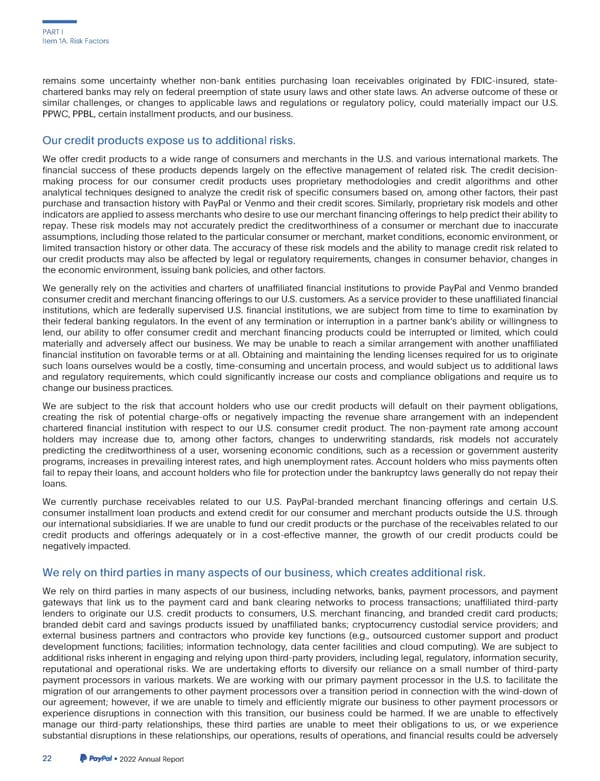PARTI Item1A.RiskFactors remains some uncertainty whether non-bank entities purchasing loan receivables originated by FDIC-insured, state- chartered banks may rely on federal preemption of state usury laws and other state laws. An adverse outcome of these or similar challenges, or changes to applicable laws and regulations or regulatory policy, could materially impact our U.S. PPWC,PPBL,certaininstallmentproducts,andourbusiness. Ourcreditproductsexposeustoadditionalrisks. Weoffer credit products to a wide range of consumers and merchants in the U.S. and various international markets. The financial success of these products depends largely on the effective management of related risk. The credit decision- making process for our consumer credit products uses proprietary methodologies and credit algorithms and other analytical techniques designed to analyze the credit risk of specific consumers based on, among other factors, their past purchase and transaction history with PayPal or Venmo and their credit scores. Similarly, proprietary risk models and other indicators are applied to assess merchantswho desireto use our merchantfinancingofferingsto help predicttheir ability to repay. These risk models may not accurately predict the creditworthiness of a consumer or merchant due to inaccurate assumptions,includingthoserelatedtotheparticularconsumerormerchant,marketconditions,economicenvironment,or limited transaction history or other data. The accuracy of these risk models and the ability to manage credit risk related to our credit products may also be affected by legal or regulatory requirements, changes in consumer behavior, changes in theeconomicenvironment,issuingbankpolicies,andotherfactors. Wegenerally rely on the activities and charters of unaffiliated financial institutions to provide PayPal and Venmo branded consumercreditandmerchantfinancingofferingstoourU.S.customers.Asaserviceprovidertotheseunaffiliatedfinancial institutions, which are federally supervised U.S. financial institutions, we are subject from time to time to examination by their federal banking regulators. In the event of any termination or interruption in a partner banks ability or willingness to lend, our ability to offer consumer credit and merchant financing products could be interrupted or limited, which could materially and adversely affect our business. We may be unable to reach a similar arrangement with another unaffiliated financial institution on favorable terms or at all. Obtaining and maintaining the lending licenses required for us to originate such loans ourselves would be a costly, time-consuming and uncertain process, and would subject us to additional laws and regulatory requirements, which could significantly increase our costs and compliance obligations and require us to changeourbusinesspractices. We are subject to the risk that account holders who use our credit products will default on their payment obligations, creating the risk of potential charge-offs or negatively impacting the revenue share arrangement with an independent chartered financial institution with respect to our U.S. consumer credit product. The non-payment rate among account holders may increase due to, among other factors, changes to underwriting standards, risk models not accurately predicting the creditworthiness of a user, worsening economic conditions, such as a recession or government austerity programs, increases in prevailing interest rates, and high unemployment rates. Account holders who miss payments often fail to repay their loans, and account holders who file for protection under the bankruptcy laws generally do not repay their loans. We currently purchase receivables related to our U.S. PayPal-branded merchant financing offerings and certain U.S. consumer installment loan products and extend credit for our consumer and merchant products outside the U.S. through our international subsidiaries. If we are unable to fund our credit products or the purchase of the receivables related to our credit products and offerings adequately or in a cost-effective manner, the growth of our credit products could be negativelyimpacted. Werelyonthirdpartiesinmanyaspectsofourbusiness,whichcreatesadditionalrisk. We rely on third parties in many aspects of our business, including networks, banks, payment processors, and payment gateways that link us to the payment card and bank clearing networks to process transactions; unaffiliated third-party lenders to originate our U.S. credit products to consumers, U.S. merchant financing, and branded credit card products; branded debit card and savings products issued by unaffiliated banks; cryptocurrency custodial service providers; and external business partners and contractors who provide key functions (e.g., outsourced customer support and product development functions; facilities; information technology, data center facilities and cloud computing). We are subject to additional risks inherent in engaging and relying upon third-party providers, including legal, regulatory, information security, reputational and operational risks. We are undertaking efforts to diversify our reliance on a small number of third-party payment processors in various markets. We are working with our primary payment processor in the U.S. to facilitate the migration of our arrangements to other payment processors over a transition period in connection with the wind-down of our agreement; however, if we are unable to timely and efficiently migrate our business to other payment processors or experience disruptions in connection with this transition, our business could be harmed. If we are unable to effectively manage our third-party relationships, these third parties are unable to meet their obligations to us, or we experience substantial disruptions in these relationships, our operations, results of operations, and financial results could be adversely 22 •2022AnnualReport
 2023 Annual Report Page 169 Page 171
2023 Annual Report Page 169 Page 171